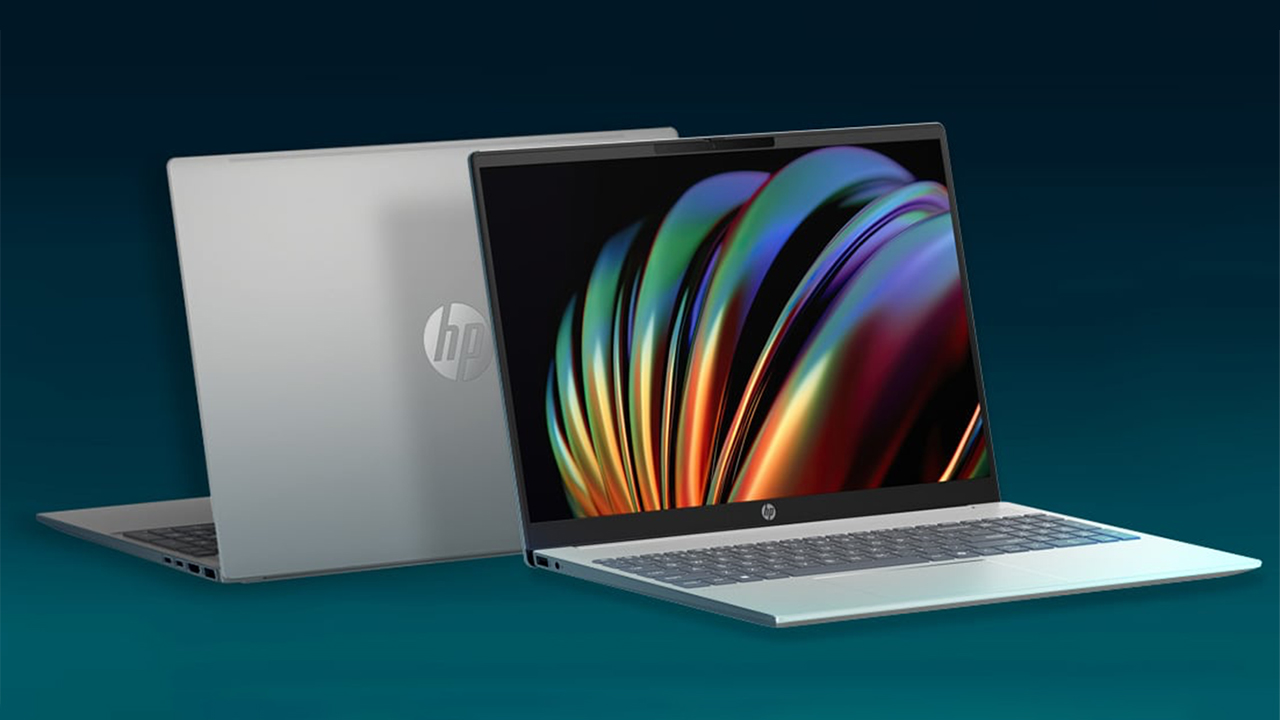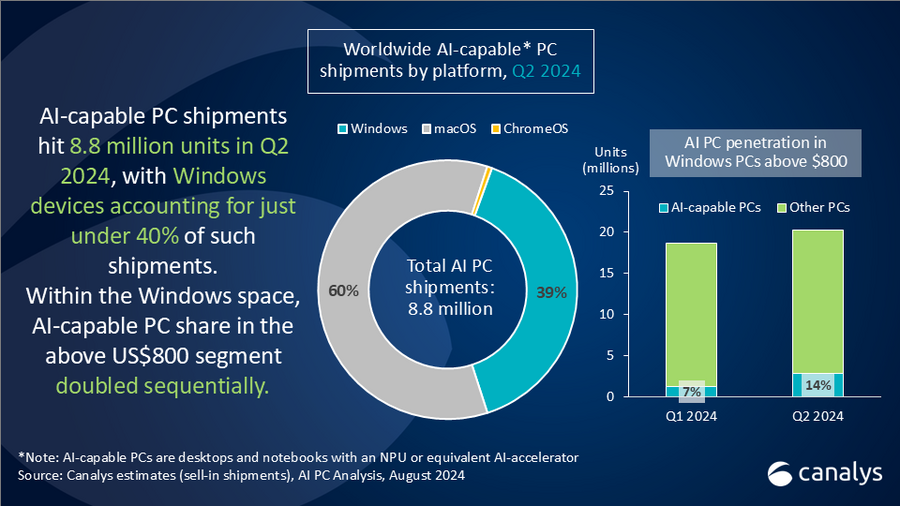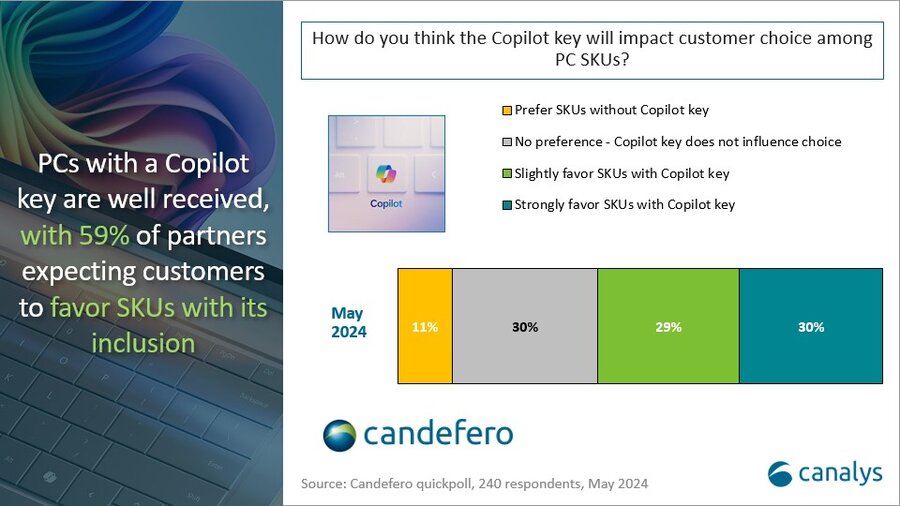8.8 million AI-capable PCs shipped in Q2 2024 — firm believes the AI PC market is on track to ship around 44 million units
More will be sold in coming quarters.

The noise around AI in general and AI PCs in particular is quite significant these days, as everyone is trying to take advantage of the buzz word and present their products as AI-capable. Technically, 14% of PCs shipped globally in the second quarter contained a neural processing unit (NPU), formally making them AI PCs, reports Canalys.
The latest CPUs from AMD, Apple, Intel, and Qualcomm contain NPUs. As a result, 8.8 million AI-capable PCs were shipped in Q2 2024, comprising 14% of total PC shipments for the quarter, reports Canalys. As AMD, Intel, and Qualcomm ramp up production of their latest processors with NPUs, analysts believe shipments of AI-capable PCs are poised for rapid growth in the latter half of 2024 and into 2025.
In the Windows segment, AI-capable PC shipments surged 127% sequentially in the second quarter. Lenovo, the world's largest PC maker, introduced its Snapdragon X Elite-based PCs, including the Yoga Slim 7x and ThinkPad T14s, boosting its AI-capable share to about 6% of total Windows PC shipments, reflecting a 228% growth. HP followed closely with an 8% share, launching the Omnibook X 14 and EliteBook Ultra G1 alongside its Core Ultra devices. With just under 7% share, Dell launched Copilot+ PCs across several lines, though availability was staggered.
"A key benefit from AI-capable PCs that has materialized for PC OEMs is the growth boost within their premium offerings," said Ishan Dutt, Principal Analyst at Canalys.
He continued, "Windows PC shipments in the above $800 range grew 9% sequentially in Q2 2024, with AI-capable PC shipments in those price bands up 126%. As the range of features from first- and third-party applications that leverage the NPU increase and the benefits to performance and efficiency become clearer, the value proposition for AI-capable PCs shall remain strong. This is especially important over the next 12 months as a significant portion of the installed base will be refreshed as part of the ongoing Windows upgrade cycle."
Meanwhile, only Qualcomm's Snapdragon X Elite processors comply with the requirements of Microsoft's Copilot+ PCs that need a 45 TOPS NPU. AMD and Intel must ship their Copilot+ platforms, the AMD Ryzen AI 300-series, and the Intel Core Ultra 2-series 'Lunar Lake.' Copilot+ requirements will likely be the standard for AI PCs, so contemporary AMD and Intel processors have an NPU; software developers will likely target Microsoft requirements, so it remains to be seen how many AI PCs shipped today will be AI-capable in a year or two.
Apple currently leads the AI-capable PC market, as all of its M-series chips have packed an NPU since 2020, and by now, there are tens of millions of Macs with a neural processing unit capable of launching AI workloads. However, while Apple's own programs use the company's NPUs, a limited number of third-party programs can take advantage of those units. Canalys believes that the introduction of Apple Intelligence, now in beta in the U.S., is set to enhance AI functionalities for Mac users, potentially scaling quickly once fully launched, given its compatibility with most existing Mac devices.
Get Tom's Hardware's best news and in-depth reviews, straight to your inbox.
Analysts from Canalys believe the AI-capable PC market is on track to ship around 44 million units in 2024 and 103 million in 2025. The combination of new product releases, wider price range availability, and growing demand for AI-enhanced features is expected to drive this growth further, solidifying AI's role in future PCs.

Anton Shilov is a contributing writer at Tom’s Hardware. Over the past couple of decades, he has covered everything from CPUs and GPUs to supercomputers and from modern process technologies and latest fab tools to high-tech industry trends.
-
Giroro I don't think it's correct to say AI PCs are popular. I doubt many people are going out of the way to buy a PC specifically because it happens to be "AI-capable".Reply
They are just buying a PC like usual, and the CPU (or GPU) just happens to have an NPU in it, by default.
If anything, it's surprising that the penetration of this AI hardware is so low. I would think the percentage of people getting this hardware on accident would have been a lot higher, so I wonder if people are specifically avoiding the PCs that are being marketed for their AI capability, and are buying last gen laptops instead. -
Eximo Three generations of AMD laptops with NPUs, and AI aside, they have the specs I would be shopping for at the moment. Decent, efficient processing cores, and the better iGPU for light gaming and graphics tasks.Reply -
Notton The title ignores the fact there is no SKU with an entirely disabled NPU.Reply
It's like Intel claiming GPU dominance in laptops when there is no -F SKU. -
DavidLejdar Reply
Yeah, not everyone of the 14% may have been specifically looking for "AI-capable". But like-wise, not everyone of the 86% may have been specifically avoiding it. In the latter case, it may just have been the cheaper option many went for. Like, when one goes shopping for a headset, and goes with a cheaper one, that supports only Stereo, and uses that as long as duct tape works... and then ends up with a better product anyhow, not wanting to go back now.Giroro said:I don't think it's correct to say AI PCs are popular. I doubt many people are going out of the way to buy a PC specifically because it happens to be "AI-capable".
They are just buying a PC like usual, and the CPU (or GPU) just happens to have an NPU in it, by default.
If anything, it's surprising that the penetration of this AI hardware is so low. I would think the percentage of people getting this hardware on accident would have been a lot higher, so I wonder if people are specifically avoiding the PCs that are being marketed for their AI capability, and are buying last gen laptops instead.
And the 14% may have been partially business customers, who already have some form of AI in use. E.g. our colleagues in Burnsville and Fort Lauderdale already use some AI, implemented with help from colleagues here in Berlin. And with such "boosts" here and there, it then needs newer hardware at least at some points. And if there are further improvements, for personal use, that might make more people interested to upgrade, for a specific purpose. -
ThomasKinsley Smartphones have had NPUs for years now (approximately 5-8 years now). I'm sure a headline could advertise this as a success for AI-capable devices when in reality people just wanted to browse the web, play games, and text their friends.Reply
But I want to draw attention to the image included in the article because this one interests and concerns me at the same time. It's not asking customers whether they prefer a CoPilot key. It's asking OEMs what they think customers will want. They could've asked people directly, but I suspect they did not because most people would say something like, "What is a CoPilot key and what does it do?" A lot of this "AI craze" is still at the OEM level and not at the consumer level.
-
KyaraM Reply
Yeah, as far I'm concerned, they can stick their copilot nonsense where the sun never shines...ThomasKinsley said:Smartphones have had NPUs for years now (approximately 5-8 years now). I'm sure a headline could advertise this as a success for AI-capable devices when in reality people just wanted to browse the web, play games, and text their friends.
But I want to draw attention to the image included in the article because this one interests and concerns me at the same time. It's not asking customers whether they prefer a CoPilot key. It's asking OEMs what they think customers will want. They could've asked people directly, but I suspect they did not because most people would say something like, "What is a CoPilot key and what does it do?" A lot of this "AI craze" is still at the OEM level and not at the consumer level.
I now also own a CPU with an NPU a Ryzen 5 7640HS. The NPU stays at 0% load at all times, because all I do on the laptop is game and friggin browse the web. It was simply something that came pre-packaged with the CPU/laptop, not something I wanted. Because I don't want anything to do wit AI, period.

